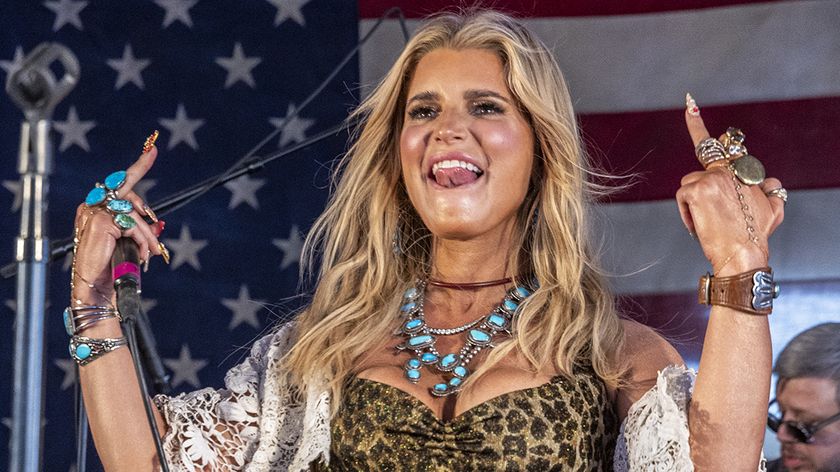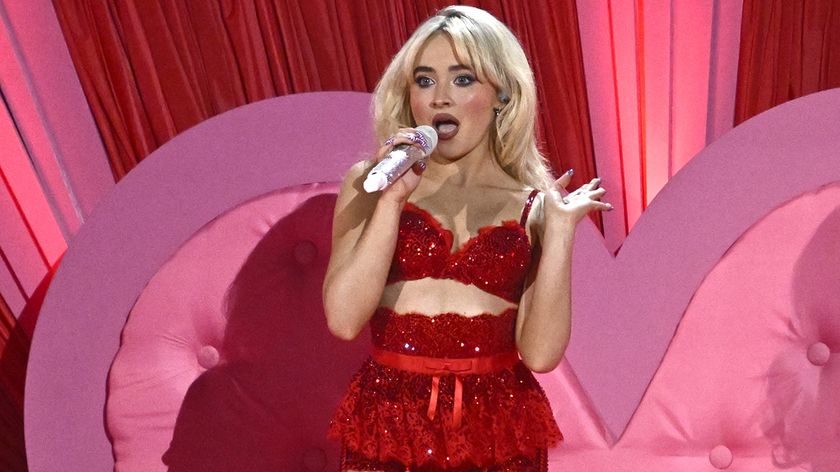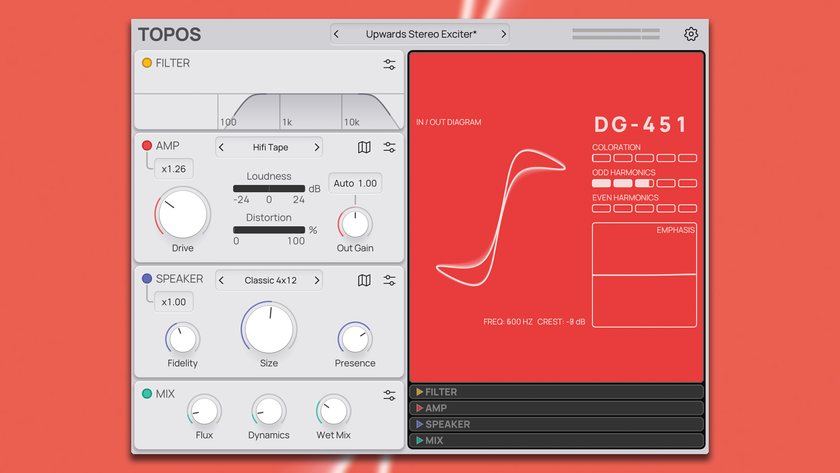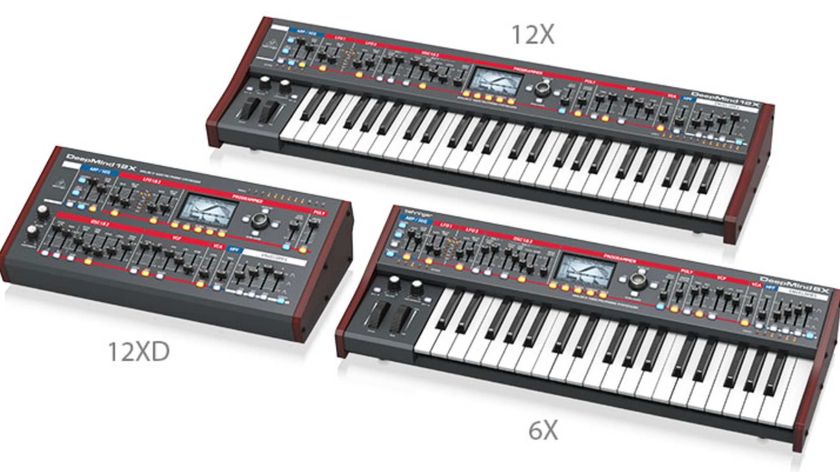

Billy Sheehan and his Mr Big mates are looking forward to playing Japan next month. "It's important on so many levels," he says.
Mr. Big bassist Billy Sheehan says that the tragic earthquake and tsunami that struck Japan on Friday 11 March affected the members of the band deeply. "Throughout our career, we've been so embraced by the people of Japan," he says. "They've really taken us into their hearts, and we feel the same way about them. To see what's happened to a big part of such a beautiful, amazing country has been heartbreaking."
The band has a tour of Japan scheduled to begin on 7 April, and according to Sheehan it's still a go, although the last date, in the northern city of Sendai, will probably be cancelled. "Sendai is a very special place for us," he says. "Back in the '80s, we were the first Western band to play there. They actually started a petition to get us to play, and 30,000 people signed it - for a venue that only has 3,000 seats! Right now, we're trying to figure out a way to play close to the city. If we can do it, we will."
Sheehan is confident that "Japan will come back bigger and better than ever. The Japanese people are strong and resilient, civilized and decent. They've been taking care of one another. There's been no looting or craziness. This is a terrible event, but if we can take anything away from it that's positive, it's the way the people of Japan have handled it.
"They want to get back to normal, too," says Sheehan. "As funny as that sounds, people have to resume living their lives as fast as they can. Which is a big reason why we can't wait to go over there. Not so much for us, but for the people who want to see us - we've gotten so many touching e-mails from fans who want us to play. And for the people who run the venues and whose incomes are derived from bands performing - if we didn't play, it would take money out of their pockets, money they really need right now. So, as you can imagine, this tour will be quite meaningful."
Along with their hits from their first go-round in the '90s - To Be With You, Green-Tinted Sixties Mind and Superfantastic, among others - the reunited Mr Big (which also includes guitar virtuoso Paul Gilbert, drummer Pat Torpey and singer Eric Martin) will be playing a generous portion of cuts from their winning new CD, What If… "The new songs have been accepted very well," says Sheehan. "Knock on wood, I think we've got a future."
MusicRadar sat down with Sheehan recently to talk about What If…, how the band has matured, and what changes he's made to his gear and practice routine. Sheehan says that he's thrilled to see the band's fame hasn't diminished over the years. Even so, he admits to witnessing a strange and perhaps inevitable phenomenon:
Get the MusicRadar Newsletter
Want all the hottest music and gear news, reviews, deals, features and more, direct to your inbox? Sign up here.
So there's tribute bands to Mr Big in Italy, huh?
[laughs] "Yeah. Five or six that I know of. It's so funny. I mean, it's an honor, of course - that's why they're called 'tribute bands.'"
Have you checked any of them out? Is it weird seeing a person on stage impersonating you?
"I have, yes. Is it weird? A little at first. There's one band called Mr Pig [laughs], and they're good. The singer is fantastic, he totally nails it. The bass player nails it. It's funny, but it's an honor. They work hard, you know? There's another band that has a girl singer, and she really gets it right. You gotta love it."
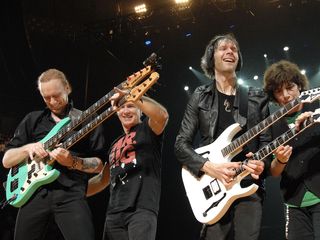
Sheehan, Pat Torpey, Paul Gilbert and Eric Martin demonstrate how four necks are better than two.
Tribute bands are one thing; the real band is something else. If someone were to have told you 10 years ago that the original group would be back together, what would you have said?
[laughs] "I wouldn't have believed them. We didn't break up in an angry, vicious way. None of that 'I never want to see you ever again' stuff. We just drifted apart. We wanted to go our separate ways. Honestly, I didn't think we'd play together ever again.
"And it was kind of foolish of me to think that, because I always hear bands go, 'Hey, that was pretty good back then. Maybe we can revisit it.' I remember our first manager, Herbie Herbert, who was really responsible for so much of our success, saying, 'You guys are going to look back on these days, and you're going to wish they lasted forever.' He was right."
Beyond financial rewards, did it feel important on an emotional level for you guys to get back together?
"Well put. Emotions were very much behind the whole thing. This is the honest truth: even if we never played a note of music, the fact that we could all sit down at dinner and become friends again, that's been the greatest thing to come out of all of this.
"I really didn't know at first if we would play, but I was just glad to reconnect with everybody. We had fantastic times in this band back in the day. Unfortunately, the bad times have a way of obscuring the good stuff, but when I think of the joy and the hilarity that we shared…it's awesome. I'm really glad that we put it back together. And the fact that we're making people happy - we've had so many fans from so many countries pleading for us to get back together - that really feels good."
Being "just regular folks"
In your opinion, how is the band different now as opposed to 20 years ago?
"A lot different. All the negatives have been drained away. We're just regular folks now, hanging out. A lot of that, speaking for myself, is because I just don't care anymore. I don't mean that in a bad way, but I don't need to try to change things or have my way for the sake of ego or whatever. I'm more supportive of everybody else now. If somebody wants to try something, hey, let's try it. Who am I to judge?
"I think that everybody else feels that way now, too. We're not four guys pulling in different directions. There's a lot more of a 'go with the flow' thing happening now. Right now, my attitude is 'sing, play bass, play guitar, drum' - if we can do that, then we're doing what we need to do. I wish I would have learned that years ago, but whatever. As long as you learn it eventually."
When Mr Big first came out 20 years ago, you earned that dreaded tag "hair band." [Sheehan laughs] You're laughing, but did it bother you at the time?
"Not really. Well, it was a little irritating, yeah. The funny thing was, the hair metal bands didn't like us, because we were players. And the players left us out of their club house because we had hair. We were out in the middle somewhere. It's hard for people to look at something and really see what's going on. You get a label attached to you - it's inevitable. You get laughed at, get joked about, you get dismissed and disparaged - it happens."
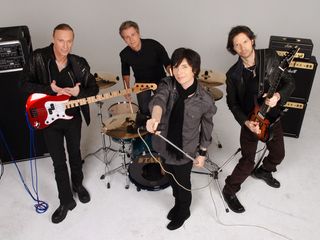
Sheehan says that re-establishing friendships with his bandmates has been "the greatest thing."
"Even today, I'll get a hundred e-mails full of praise, and then I'll get that one that says, 'you suck,' and that's the one I'll focus on. So back to the hair metal question, yeah, it was a little bothersome, but it came with the territory. For every naysayer, there were arenas full of people. That's a trade-off I could live with."
Kevin Shirley produced What If… How did you like working with him? He likes to move things along pretty quickly in the studio.
"He does. We knew his history and the records he's done, and they really cover a lot of ground, everybody from The Black Crowes to Iron Maiden to mixing Led Zeppelin, mixing Rush - I definitely felt like he could get what we wanted to do.
"He was an unobvious lucky choice. After we played the first couple of songs, Kevin said to us, 'You guys are a live band, so that's how we should record the album. We're not going to be doing any overdubs.' Paul and I looked at each other for a second, like, 'Uh-oh…' But his style of recording ended up working. It put a sort of unexpected pressure on us, and I think a lot of energy came from it. Knowing we couldn't go in and fix a lot of things made us dig in and get it right. We'd play a song and Kevin would go, 'Sounds good. Let's move on.' We got worked hard."
Pushing the limits while keeping the beat
Talk to me about the song Around The World. You and Paul do some amazing unison playing on that.
"Thank you. Knowing the way Kevin was recording, there was some high intensity going on. That song came about from snippets of things Paul and I had done, things we kind of knew. We're both very familiar with each other's styles, so there is a bit of musical intuition between us. The initial riff that opens the song is mine, and then Paul did a climbing riff at the beginning of the solo section, which is pretty tricky. As we've played through the years, we've learned to speak the same language."
Good rhythm sections are magical, mystical combinations. I'm curious as to how you lock in with Pat Torpey.
"You're right, they are mysterious components in a band. I watch Pat like a hawk. A drummer is the most important guy in the band. He drives the car. As a bass player, I am glued to Pat's snare and bass drum. In fact, in preparing for this tour, Pat and I have gotten together to play - just bass and drums, every song. I want to know exactly what Pat is going to do so I can ingrain it into my playing and be ready for anything. He's a master at his craft, a true unsung hero of the band. I'm all for following him.
"This is something I preach at my bass clinics ad nauseum. The kids never want to listen, but I keep drilling it into 'em. [laughs] I tell them, 'You've got to play in time. Tap your foot, tap your foot. I want you to tap your foot and play.' I say it over and over. And a lot of these kids are great players, but they don't want to focus on rhythm - they just want to do the flash stuff. Then, suddenly, something happens and they'll do it, they'll play in time, and it's a revelation to them. 'Oh yeahhhhh!'" [laughs]
Given what you just said, I take it that you have no problem keeping it simple on more straight-ahead songs like Stranger In My Life and All The Way Up.
"Not at all. It's a common sense thing. In the song To Be With You, I wouldn't play a bass solo. I know my reputation precedes me and people sometimes view the frosting without the cake; they think that I'm begrudgingly playing these lesser amount of notes on certain songs. The fact is, I love it. All The Way Up is a really cool piece. Stranger In My Life is one of our favorites.
"It doesn't have to be fast and loud - I've never been like that. People will post YouTube videos of me doing hammer-ons and sweep arpeggios, but they won't post a clip of me just keeping a groove - and if they do, it'll get, like, three hits. [laughs] It's a funny thing. But I love playng along to great songs and seeing an audience of 10,000 people singing along - it's beautiful."
Singing bass players - a rare breed
Speaking of singing, you sing while playing the bass. Is it as hard as it looks?
"It's pretty tricky. I work at it a lot. I can strum the guitar and sing all day long. But to play bass and sing at the same time, especially with some of the things I do with my right hand, it's hard. It doesn't come naturally, but it can be done. You just have to sit down and work out your parts.
"The song Undertow was surprisingly hard. I'm doing these sixteenth notes, and the singing I'm doing doesn't correspond to the notes. I had to work on that. You have to keep your mind on both aspects of what you're doing: you concentrate on the singing, but you have to keep focused on the bass playing, too. One can't fall behind or else everything falls apart. I sit in my home studio and play something over and over again until it's flowing. And it's layers of things, too - pitch, timing, and oh, the lyrics! I have to remember the words. [laughs] Yeah, it's not easy.
"I remember when we had the great honor of touring with Rush at one point, and I'd sit and talk to Geddy Lee about it. He's one of the sweetest guys around, by the way. But he told me that he has to work at it big-time. I don't know anybody who does it better than him. Sting, he drifts through his bass playing by dropping time while still keeping time. It's quite an art."
From what Paul told me recently, the writing for What If… was fairly democratic. I asked him this, so I'll ask you, too: What do you do when somebody presents something you absolutely hate?
[laughs] "There has to be some diplomacy there. You have to say things in a respectful way. But there have been times where songs started out not so great, and they wound up fantastc. And vice-versa: there have been songs that everybody was all excited about at first, and they just didn't work. But we generally try to give things a try, because you never know. We had a lot of songs, lots of bits and pieces going into the album, so everybody had to keep an open mind."
At this point, are there still aspects of your bass playing you're unhappy with?
"My general point of view about my playng is that it's not that good. Seriously. I'm not saying this as a false humility thing. There's things that I've done, so I don't think about those - I've done them. But, for instance, there's this Bach piece that I've been working on for years. I almost put it on my last solo record, but it didn't sound right to my ears. It's a violo solo from one of the Brandenburg concertos - it's really tough, the fingering is impossible, but it's starting to come."
"I'm always fine-tuning everything. It doesn't always mean playing fast and crazy. I work on all the various ways you can possibly play a note, all the nuances. A big thing to me is trying to translate what I can play at home and do the same thing on stage. The stage is such a different animal from anywhere else."
Let's tak about your basses and the gear you used on What If… Did you use the prototype of the new Yamaha Attitude III?
"No, I used the last incarnation of version II of the Attitude. Yamaha did a limited run of 100 for its 25th anniversary, but I only got one."
You only got one? Dude, what's up with that?
[laughs] "Yeah, I wanted more. I need something for my retirement fund. But I used that same bass on every song. For amps, I used Hartke. Sadly, very reluctantly, I left Ampeg after many, many years. Larry Hartke has been a friend for a long time, and he said he'd love to have me try some things out - no obligations, no strings attached - and I really liked them. I used the LH1000 head for the lows and the HA5500C head for the highs, along with my Pierce preamp and a little Ashley Audio compression. For cabinets, I used Hartke - a single AK 4x10 for the lows and an single AK 4x15 for the highs. Paper speakers, too, not metal."
You don't go direct at all in the sudio?
"They had a direct signal, but I always discourage it. I'm listening to the amps and working off of them, and a direct signal is a totally different tone. I like using my amps. I can get clean, distortion and super low-end. I have everything I need."
Listen up! Words of wisdom
Last question: What kind of advice do you have for bassists who truly want to become accomplished players?
"Diversify. Listen to lots of different players and different genres of music. Listen to Ron Carter, Ray Brown - just some of the standup greats. Then listen to the original masters that set us all on our way: Jack Bruce, Tim Bogert, Paul McCartney, Paul Samwell-Smith. And there's more: Stu Hamm, Jeff Berlin, Jaco, Victor Wooten, Stanley Clarke. Try to get a piece of what each player is doing.
"Pop tunes of the '60s and '70s, too. I love listening to what bassists like Carol Kaye did on vocal tunes. They found all the right spots, and a lot of the time, the tone they had, the hooks they came up with, they really made the song.
"If you increase your awareness of what all these people are doing and have done, you're really going to help yourself. A heavy metal bassist who only wants to listen to heavy metal is shooting himself in the foot, in my opinion. Don't limit yourself. Shred guitar-type music is great, but it's a microcosm of what's out there. Don't be afraid to listen to Tony Bennett or Joni Mitchell. Pop music, singers, songwriters…there's so much to absorb. By the same token, I'm not dismissing shred music. Take it all in. There's as much to learn from shed as there is from The Everly Brothers."
Joe is a freelance journalist who has, over the past few decades, interviewed hundreds of guitarists for Guitar World, Guitar Player, MusicRadar and Classic Rock. He is also a former editor of Guitar World, contributing writer for Guitar Aficionado and VP of A&R for Island Records. He’s an enthusiastic guitarist, but he’s nowhere near the likes of the people he interviews. Surprisingly, his skills are more suited to the drums. If you need a drummer for your Beatles tribute band, look him up.

"Reggae is more freeform than the blues. But more important, reggae is for everyone": Bob Marley and the Wailers' Catch a Fire, track-by-track

“Part of a beautiful American tradition”: A music theory expert explains the country roots of Beyoncé’s Texas Hold ‘Em, and why it also owes a debt to the blues


